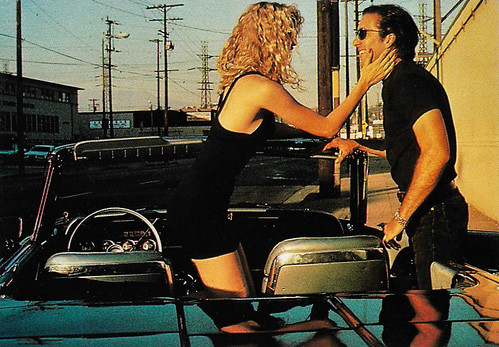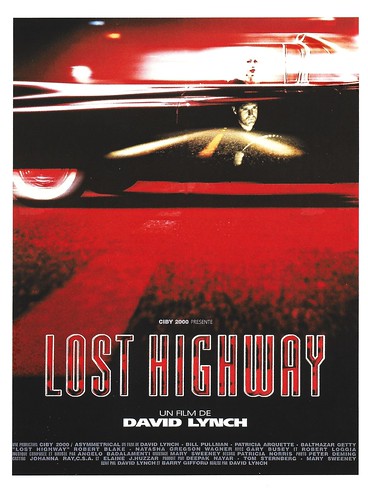
French postcard by CartCom for Télérama. Photo: Richard Dumas / Télérama. David Lynch (1946-2025).

Chinese postcard. Laura Harring in Mulholland Dr. (David Lynch, 2001).

Chinese postcard. Richard Farnsworth in The Straight Story (David Lynch, 1999).
A success in the midnight movie Underground Circuit
David Keith Lynch was born in 1946 in Missoula, Montana, precisely the kind of small-town American setting so familiar from his films. His father, Donald Walton Lynch was a research scientist working for the U.S. Department of Agriculture (USDA), and his mother, Edwina ‘Sunny’ Lynch née Sundholm, was an English language tutor.
Lynch initially wanted to become a painter. He attended several art schools until he found his niche at the Pennsylvania Academy of Fine Arts where he started working with film. He married Peggy Reavey and then fathered future director Jennifer Lynch shortly after he turned 21. During this period, he made four short films with a grant from the American Film Institute.
His first short was Six Men Getting Sick (Six Times) (1967). Lynch played it on a loop at the academy's annual end-of-year exhibit, where it shared the joint-first prize with a painting by Noel Mahaffey. After several exhibitions in local galleries, he moved to Los Angeles where he studied at the AFI Center for Advanced Film Studies. There he started his first larger project, on which he worked obsessively for five years, Eraserhead (1976).
Filmed in black and white, Eraserhead tells the story of Henry (Jack Nance), a quiet young man, living in a dystopian industrial wasteland, whose girlfriend gives birth to a deformed baby whom she leaves in his care. The film reflects dangerous and terrifying elements he encountered while living and studying in a particularly violent and run-down area of Philadelphia. Eraserhead saw success in the midnight movie underground circuit.
Stuart Cornfeld, an executive producer for Brooksfilms, Mel Brooks' newly formed production company, saw it and agreed to help Lynch with his next film. Lynch asked Cornfeld to find him a script by someone else that he could direct. Lynch chose the biographical drama The Elephant Man (1980) by Christopher De Vore and Eric Bergren. It was based on the true story of Joseph Merrick (John Hurt), a severely deformed man in Victorian London, who was held in a sideshow but later taken under the care of a London surgeon, Frederick Treves (Anthony Hopkins). Though surrealistic and in black and white, it is one of the more conventional of Lynch's films. The Elephant Man was a huge critical and commercial success, earning eight Academy Award nominations, including Best Director and Best Adapted Screenplay.

French postcard by Editions F. Nugeron, no. E 411. French poster for The Elephant Man (David Lynch, 1980).

Danish postcard by Forlaget "Holger Danske", Denmark, no. 608. Isabella Rossellini in Blue Velvet (David Lynch, 1986).
A hugely expensive commercial disaster
In 1980, David Lynch was known as one of the most promising new talents in Hollywood. Producer Dino de Laurentiis asked Lynch to create a film adaptation of Frank Herbert's Science Fiction novel ‘Dune’. It became a hugely expensive commercial disaster.
The film is set in the far future when humans live in an interstellar empire under a feudal system. Paul Atreides (Kyle MacLachlan) is the son of a noble who takes control of the desert planet Arrakis, which grows the rare spice melange, the empire's most highly prized commodity.
Lynch was unhappy with the work and didn't have the final cut. Dune cost $45 million to make and grossed $27.4 million domestically. Lynch was contractually obliged to produce two other projects for De Laurentiis, the first a planned sequel to Dune, which due to the film's failure never went beyond the script stage.
The other was a more personal work, the thriller Blue Velvet (1986). Kyle MacLachlan plays a college student, Jeffrey Beaumont, who finds a severed ear in a field. Investigating further with the help of friend Sandy (Laura Dern), he discovers that it is related to a criminal gang led by psychopath Frank Booth (Dennis Hopper). Frank has kidnapped the husband and child of singer Dorothy Vallens (Isabella Rossellini) and repeatedly rapes her.
Blue Velvet was Lynch's first collaboration with composer Angelo Badalamenti, who has since written the music for all of Lynch's films. For Blue Velvet, Lynch received his second Oscar nomination. It became a huge critical and moderate commercial success.

French postcard by Sonis, no. C. 146. Photo: BAC Films. Nicolas Cage and Laura Dern in Wild at Heart (David Lynch, 1990).

French postcard by Sonis, no. C. 146. Photo: BAC Films. Nicolas Cage and Laura Dern in Wild at Heart (David Lynch, 1990).
A 300-mile journey on a lawnmower
In 1986, David Lynch met screenwriter producer Mark Frost and they started to develop some projects. They created for television the drama series Twin Peaks (1990–1991), set in a small Washington town where popular high school student Laura Palmer has been murdered. Twin Peaks featured FBI Special Agent Dale Cooper (Kyle MacLachlan) as the investigator trying to identify the killer and discover not only the murder's supernatural aspects but also many of the townsfolk's secrets. Lynch portrayed FBI agent Gordon Cole in the series.
35 million viewers watched the pilot and the series soon spawned a cult following. Lynch received five Primetime Emmy Award nominations for the drama series, including Outstanding Directing and Outstanding Writing. Twin Peaks was sold to 55 countries. Lynch co-wrote and directed a film prequel, Twin Peaks: Fire Walk with Me (1992), and a third season in 2017.
His next film, the romantic and violent crime drama Wild at Heart (1990) starring Nicolas Cage as Sailor and Laura Dern as Lula, won the Palme d'Or (Golden Palm) at the Cannes Film Festival. Although he focused almost exclusively on the United States, Lynch had a large audience in Europe and especially France, where several of his later films were co-financed by French production companies.
Lynch won the César twice for ‘Best Foreign Film’. After a few unsuccessful TV ventures, Lynch returned to film. In 1997, he released the Neo-Noir Lost Highway (1997), which was co-written by Barry Gifford and starred Bill Pullman and Patricia Arquette. The film failed commercially and received a mixed response from critics.
Lynch then filmed the biographical drama The Straight Story (1999), based on the true story of Alvin Straight (Richard Farnsworth), an elderly man from Laurens, Iowa, who goes on a 300-mile journey to visit his sick brother (Harry Dean Stanton) in Mount Zion, Wisconsin, by riding a lawnmower. The plot seemed far removed from Lynch's earlier works, but in fact, Lynch made a surreal road movie. Walt Disney Pictures acquired the distribution rights.

American postcard by Smith Western Co., Tacoma, WA, no. CT-3610. Photo: Kyle Smith. Caption: North Bend, Washington - Gateway to the Cascades. Mt. Si is a local attraction, best known for its hiking, hunting, fishing and camping.

French poster postcard by Editions 'Humour à la Carte', Paris, no. A-C 91. British poster by EMI for The Elephant Man (David Lynch, 1980) with John Hurt.
Fearlessly breaking boundaries in the pursuit of his unique cinematic vision
ABC Network gave David Lynch the go-ahead to shoot a two-hour pilot for the series Mulholland Drive but disputes over content and running time led to the project being shelved indefinitely. But with $7 million from the French production company StudioCanal, Lynch completed the pilot as a film, the Neo-Noir Mulholland Dr. (2001).
The film, a non-linear narrative surrealist tale of Hollywood's dark side, stars Naomi Watts, Laura Harring and Justin Theroux. It performed relatively well at the box office worldwide and was a critical success, earning Lynch the Best Director award at the 2001 Cannes Film Festival (shared with Joel Coen for The Man Who Wasn't There) and his third Academy Award nomination for Best Director.
In 2006, Lynch's longest film, Inland Empire, was released. Like Mulholland Dr. and Lost Highway, it does not follow a traditional narrative structure. It stars Lynch regulars Laura Dern, Harry Dean Stanton and Justin Theroux. Interested in working with Werner Herzog, Lynch collaborated on Herzog's film My Son, My Son, What Have Ye Done? (2009). With a nonstandard narrative, the film is based on a true story of an actor who committed matricide while acting in a production of the 'Oresteia' and starred Lynch regular Grace Zabriskie.
He portrayed Howard in the drama film Lucky (John Carroll Lynch, 2017) alongside friend and collaborator Harry Dean Stanton, and director John Ford in Steven Spielberg's The Fabelmans (2022). He also guest-starred in shows, voicing a bartender in The Cleveland Show (2010–2013) and playing an entertainment veteran in Louie (2012). In 2019, he received an honorary Oscar ‘for fearlessly breaking boundaries in the pursuit of his unique cinematic vision’.
David Lynch was married four times and was the father of two sons and two daughters. In August 2024, he announced he was suffering from pulmonary emphysema due to years of smoking. This left him unable to leave his home. In January 2025, he was evacuated from his home due to the Los Angeles wildfires, after which his health deteriorated rapidly. He died on 15 January 2025 in the home of one of his daughters.

Vintage poster postcard, no. Z 1064. British poster for Wild at Heart (David Lynch, 1990) with Nicolas Cage and Laura Dern. Caption: From the director of Blue Velvet.

Swiss poster postcard by CVP Publishers / News Productions. Image: Collection Cinémathèque Suisse, Lausanne. French poster for Lost Highway (David Lynch, 1997).

Dutch poster postcard by A-Film. Poster for Mulholland Drive (David Lynch, 2001) with Naomi Watts and Laura Harring.
Sources: Michael Brooke (IMDb), Wikipedia (Dutch, German and English) and IMDb.
No comments:
Post a Comment